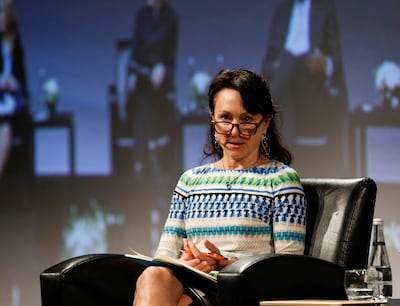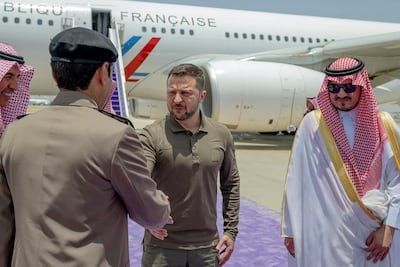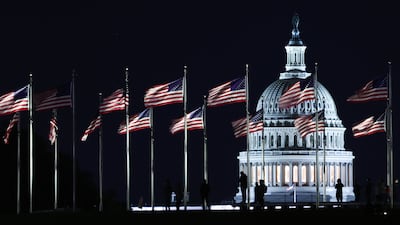The global battle for the balance of power is up for grabs, the head of a leading think tank has told The National, with the US position being challenged by China and a host of smaller countries gaining traction.
The result is that western countries are going to have to “try a bit harder than they have in the past” to gain support that they previously took for granted, said Karin von Hippel, director general of the London-based Royal United Services Institute.
“There needs to be a bit more listening, which is maybe not a bad thing,” she added.
Furthermore, she said other powers, including Saudi Arabia and UAE, were able to “have a bigger voice” in world politics.
US-born Ms von Hippel, whose parents fled Germany and Austria due to Hitler's rise, is well positioned to judge the actions and global position of her country, having served as a State Department adviser for six years.
“America is not looked at the same way as it was in the past and meanwhile other countries are increasing their power and their voice,” she said, speaking from her small office overlooking Whitehall’s government buildings.
“Whether it's China as a new superpower, or small countries, more confidently asserting themselves – all of this is changing the way that geopolitics is organised.”
Thorny challenges
Founded in 1831, Rusi is the world’s oldest defence and security think tank, and perhaps its relevance is now more important than ever in finding “practical solutions to thorny challenges”, said Ms von Hippel.
“That doesn't mean we come up with the right answers but we try to provide a forum where we can debate and provide some creative options and ideas.”
Based in the heart of Britain’s political landscape, close to Downing Street, Rusi has the ability to bring together thinkers from all quarters.
“We all know that right now we need to be thinking over the horizon,” she said. “For government, there's rarely enough time to do this in a meaningful way, but in a think tank we do have that time and we believe – and hope – it gives results.”
Global friction
A series of factors – Ukraine, the growing impact of climate change, threats from artificial intelligence, friction with China and America’s growing domestic polarisation – have contributed to a more unpredictable and unstable state of global affairs, Ms von Hippel argued.
“I'm sure there are other periods of time when things felt equally unstable but I suspect that the change now is really by how rapidly technology is advancing,” she said.
That churn has made forecasting and projections an error-strewn task, meaning that governments “will have to learn better how to deal with uncertainty and grey areas”.
“Maybe that means thinking through crazy scenarios a lot more,” added the academic, who worked for the UN and the EU in Somalia and Kosovo.
“So that you're prepared for a range of outcomes, but that rarely happens, perhaps because people focus more on threats that they know.”

Lining up with support
The Ukraine war had taught the West a lesson not to assume that non-western countries would automatically “line up behind them”, said Ms von Hippel, who has led Rusi since 2015.
Some have aligned with China and also with Russia, which came as a surprise to western political leaders.
“The Russians in particular have been very good at misinformation in a lot of places where we don't really lift our game,” she explained.
That led to many countries, particularly in Africa, accepting the Russian narrative that the West had started the war by attempting to bring Ukraine into the Nato alliance.
But the war has led other powers such as India, Brazil, South Africa, Turkey and Saudi Arabia to remain publicly non-aligned.
These trends, she argued, were accelerated during the Trump era, which “shook up global geopolitics”, with many traditional American allies realising that they could not always rely on Washington.
A second Trump term
World affairs will be significantly shaken up next year if Donald Trump wins the coming presidential election in November, which she suggests would herald “the end of America's global leadership role”.
Like the Covid-19 pandemic, such an outcome would significantly ruffle world equilibrium.
“We already know now if he comes back we'll go in this certain direction,” she said. “We barely survived four years of him last time when Trump didn't want to lead at all – instead he just got out of the way and barked at a few people.”
A Trump return could mean that allies are again treated “badly” and enemies “well”, which would be “dangerous for America’s standing”.
It could also well lead to western politicians deciding “OK, let's ignore America and move on”.
Mr Trump's possible re-election, despite his current indictments, would further undermine America’s global standing as countries will see him as a president who can “undo any deal that America strikes”.
“America's word won't mean anything any more,” she added.
Bigger voice on world stage
For those countries now finding a bigger voice, she highlighted Saudi Arabia hosting the Ukraine peace summit in Jeddah, which included major powers such as China, India and Britain.
Russia was omitted from the invitation which she suggested meant there was some frustration with Moscow.
“We've seen several times that the Russians promise something to the Saudis, and then don't do it, “Ms von Hippel said.
“There's certainly concern about the Russians from many of these countries.”
Like many, the academic, who has direct experience in more than two dozen conflict zones, observed that the Abraham Accords with Israel had led to a “general shake up in the Middle East” with improved relations.

Climate conflict
Ms von Hippel was an adviser to Gen John Allen when he was special presidential envoy for the Global Coalition to Counter ISIS, an organisation she argued proved the globe could unite to tackle threats.
“The interesting thing was the coalition was a really good model for global collaboration because people came together for a purpose but it doesn’t need to be a permanent structure or mission,” she said. “Once the threat has subsided, focus can shift elsewhere.”
That unity will be required to address the “huge geopolitical fallout” emerging from the climate emergency that will likely see the mass migration of people to cooler climates in the Northern Hemisphere
“The numbers now are nothing compared to what the predictions are in 20 or 30 years, it's, quite extraordinary,” she said.
But the world was “still not dealing with the problem in the right way”, as climate change will expand poverty, which will almost certainly lead to further conflict
“So we need another approach as this is only going to get worse over the longer term,” she said while admitting that politically it will be a “difficult thing to do”.
The effects of climate change may end up “being more important than everything else”, she said.


